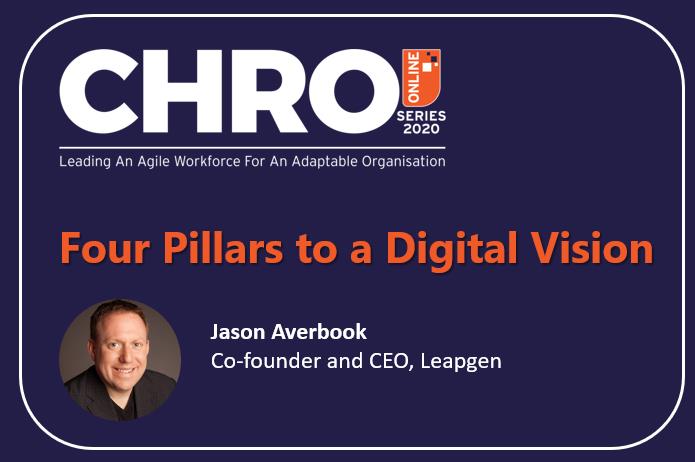Four pillars to a digital vision
By Jason Averbook, Global Keynote Speaker, and CEO & Co-Founder, Leapgen.

Why is the CHRO Online Series 2020 one of the most important events for HR leaders? Why do I keep saying this is the biggest opportunity – the biggest moment – of our collective HR careers?
We were not ready for Workforce 2020, let alone the health, social, and financial pandemics of 2020. We accepted inhibitors to innovation. We offered excuses for status quo. We did not transform when it made good business sense and would have been an ideal competitive advantage. We waited to drive necessary transformation, and waiting is no longer an option.
We needed to break down inhibitors; now they are gone. We needed an accelerant for digital transformation and to catch up to 2020; we got it. We needed to transform faster than we were ready; we just leapfrogged decades ahead of where we were when it comes to how we serve and support both the workforce and the business.
All of those things happened without having to make a business case for it; without requesting budget for it; without getting buy-in from necessary stakeholders and creating a programmatic, scaled, phased rollout. It just happened.
But our forced and temporary transformation will not sustain itself without the next, critical step. A massive boulder was rolled partway uphill for us, but it is up to us to keep it there, to prevent it from rolling back downhill, and to continue our pursuit for the summit. We do that with mindset and with a Digital Vision.
Meaningful, sustained digital transformation requires full commitment and acceptance of the change that is needed. It also requires a Digital Vision, and that has four pillars:
Four Pillars to a Digital Vision:
- Story (Vision Statement): This is a declaration of what Digital HR should be at your organisation, how it will deliver value, and to whom.
- Guiding Principles: Your framework of rules and values that add context to the story and guide decision making.
- Experience (Attributes): How will things look and feel to different workforce personas? What is the literal feeling you want people to have as a result of the experience you deliver?
- Measures of Success: How will you define success and drive accountability in alignment with the vision and guiding principles? This is where we begin to prove the value the HR function can provide to the business. A measure of success, by the way, is not an implementation “go-live”; these are your go-begin programme milestones.
When it comes to a Digital Vision for your organisation, ask what you are trying to achieve. Create a business case against that vision; this is not an HR case. Leapgen offers 5 simple steps for Making Your Business Case in the Now of Work if you need help. And embrace change as a mindset and embedded approach in your overall transformation, not an action.
Jason Averbook will be sharing more about Writing the New Book of Work and driving Digital Transformation at CHRO Indonesia (10 November 2020), CHRO Malaysia (24 November 2020) and CHRO Singapore (2 December 2020).
Averbook will be joined by Josh Bersin, Global Industry Analyst and Dean of the Josh Bersin Academy, who will examine the new world of HR and HR Tech for 2021 by presenting his latest research on the new role of HR and HR technology in the post-pandemic economy.
To register for CHRO Online Series 2020, which is sponsored and supported by ADP, Microsoft, Achievers and BPP click here. For more information on how you can participate in CHRO Online Series 2020, get in touch with Luke Kasprzak at [email protected].



